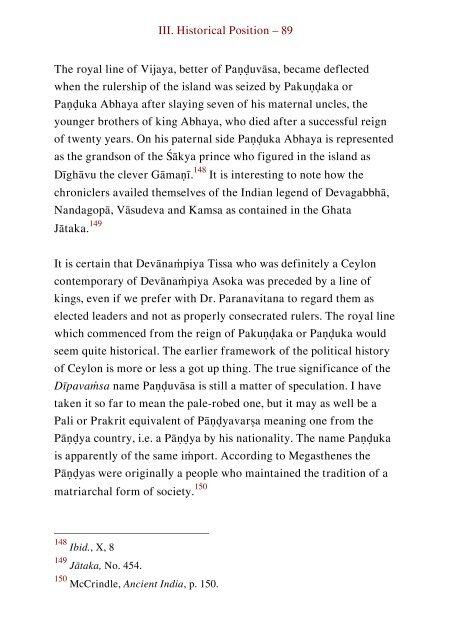On the Chronicles of Ceylon
A judicious appraisal of the various Chronicles that were written in Sri Lanka, assessing their chronology, literary and historical character.
A judicious appraisal of the various Chronicles that were written in Sri Lanka, assessing their chronology, literary and historical character.
- No tags were found...
You also want an ePaper? Increase the reach of your titles
YUMPU automatically turns print PDFs into web optimized ePapers that Google loves.
III. Historical Position – 89<br />
The royal line <strong>of</strong> Vijaya, better <strong>of</strong> Paṇḍuvāsa, became deflected<br />
when <strong>the</strong> rulership <strong>of</strong> <strong>the</strong> island was seized by Pakuṇḍaka or<br />
Paṇḍuka Abhaya after slaying seven <strong>of</strong> his maternal uncles, <strong>the</strong><br />
younger bro<strong>the</strong>rs <strong>of</strong> king Abhaya, who died after a successful reign<br />
<strong>of</strong> twenty years. <strong>On</strong> his paternal side Paṇḍuka Abhaya is represented<br />
as <strong>the</strong> grandson <strong>of</strong> <strong>the</strong> Śākya prince who figured in <strong>the</strong> island as<br />
Dīghāvu <strong>the</strong> clever Gāmaṇī. 148 It is interesting to note how <strong>the</strong><br />
chroniclers availed <strong>the</strong>mselves <strong>of</strong> <strong>the</strong> Indian legend <strong>of</strong> Devagabbhā,<br />
Nandagopā, Vāsudeva and Kamsa as contained in <strong>the</strong> Ghata<br />
Jātaka. 149<br />
It is certain that Devānaṁpiya Tissa who was definitely a <strong>Ceylon</strong><br />
contemporary <strong>of</strong> Devānaṁpiya Asoka was preceded by a line <strong>of</strong><br />
kings, even if we prefer with Dr. Paranavitana to regard <strong>the</strong>m as<br />
elected leaders and not as properly consecrated rulers. The royal line<br />
which commenced from <strong>the</strong> reign <strong>of</strong> Pakuṇḍaka or Paṇḍuka would<br />
seem quite historical. The earlier framework <strong>of</strong> <strong>the</strong> political history<br />
<strong>of</strong> <strong>Ceylon</strong> is more or less a got up thing. The true significance <strong>of</strong> <strong>the</strong><br />
Dīpavaṁsa name Paṇḍuvāsa is still a matter <strong>of</strong> speculation. I have<br />
taken it so far to mean <strong>the</strong> pale-robed one, but it may as well be a<br />
Pali or Prakrit equivalent <strong>of</strong> Pāṇḍyavarṣa meaning one from <strong>the</strong><br />
Pāṇḍya country, i.e. a Pāṇḍya by his nationality. The name Paṇḍuka<br />
is apparently <strong>of</strong> <strong>the</strong> same iṁport. According to Megas<strong>the</strong>nes <strong>the</strong><br />
Pāṇḍyas were originally a people who maintained <strong>the</strong> tradition <strong>of</strong> a<br />
matriarchal form <strong>of</strong> society. 150<br />
148 Ibid., X, 8<br />
149 Jātaka, No. 454.<br />
150 McCrindle, Ancient India, p. 150.


















